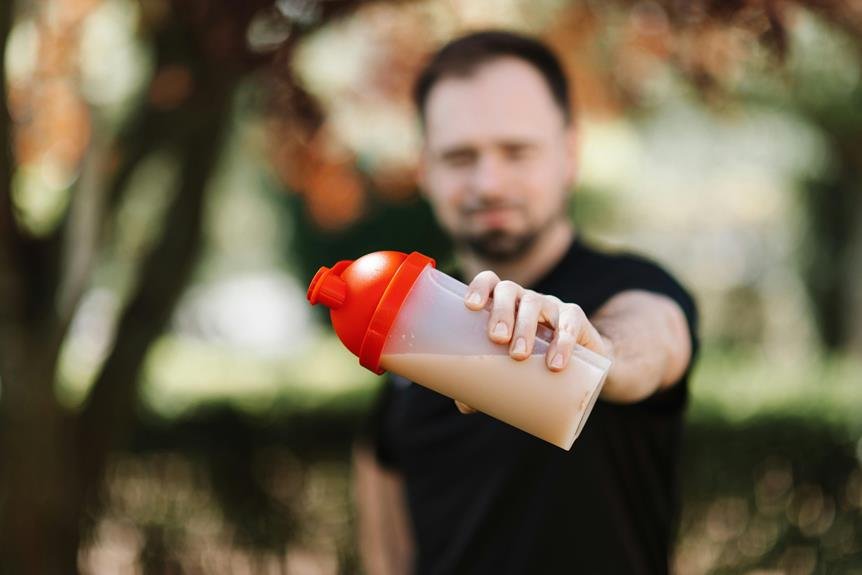
To understand the significance of protein in muscle building and recovery, consider this: your muscles undergo stress during workouts, necessitating protein for repair and growth. However, the mere consumption of protein is not enough; timing and quality play crucial roles in maximizing muscle development and recuperation. How exactly does protein facilitate these processes and what are the best practices for incorporating it into your routine for optimal results? Let's explore the intricate relationship between protein and muscle health to unlock the secrets behind achieving your fitness objectives effectively.
Importance of Protein in Muscle Development
When it comes to building muscle, protein plays a crucial role in providing the essential building blocks for growth and repair. Your body needs protein to repair and build muscle tissue that's broken down during exercise. When you engage in strength training or any form of resistance exercise, tiny tears occur in your muscle fibers. Protein is necessary to repair these tears, making the muscle fibers stronger and larger in the process.
Incorporating an adequate amount of protein into your diet is essential to support muscle development. Consuming protein-rich foods such as lean meats, poultry, fish, eggs, dairy products, legumes, and nuts can help you meet your daily protein requirements. The amino acids found in protein are the building blocks of muscle tissue, promoting muscle growth and strength.
To maximize muscle development, it's recommended to consume protein both before and after your workouts. Pre-workout protein can provide your muscles with the necessary nutrients for energy and repair, while post-workout protein aids in muscle recovery and growth. By prioritizing protein intake, you can effectively support muscle development and achieve your fitness goals.
Protein's Role in Muscle Recovery
Protein plays a vital role in facilitating muscle recovery after intense physical activity. When you engage in workouts that challenge your muscles, small tears occur in the muscle fibers. Protein is essential for repairing these tears and promoting muscle growth. Consuming protein post-workout provides the necessary building blocks, amino acids, for repairing and rebuilding muscle tissue.
During exercise, especially resistance training, muscle protein breakdown increases. Protein consumption post-exercise helps to reverse this breakdown by stimulating muscle protein synthesis. This process is crucial for muscle repair and growth. Additionally, protein can help reduce muscle soreness and fatigue after a tough workout, allowing you to recover faster and get back to your training routine sooner.
To maximize the benefits of protein for muscle recovery, aim to consume a source of protein within 30 minutes to an hour after your workout. This timing can enhance the muscle repair process and optimize your recovery efforts. Remember to choose high-quality protein sources like lean meats, poultry, fish, eggs, dairy, legumes, and plant-based proteins to support your muscle recovery effectively.
Optimizing Protein Intake for Muscle Building
To enhance muscle building effectively, optimizing your protein intake is crucial. Consuming an adequate amount of protein is essential for muscle growth and repair. Research suggests that aiming for a daily intake of 1.2 to 2.2 grams of protein per kilogram of body weight can support muscle building efforts. Timing is also important – spreading your protein intake evenly throughout the day, including post-workout, can maximize muscle protein synthesis.
Moreover, the quality of protein sources matters. Opt for complete proteins that contain all essential amino acids, such as those found in animal products like meat, poultry, fish, eggs, and dairy. Plant-based sources like quinoa, soy, and legumes can also be combined to form complete proteins. Supplementing with protein powders can be convenient, especially for individuals with higher protein needs or busy lifestyles.
Remember to stay hydrated, as water is essential for protein metabolism and muscle function. Balancing protein intake with carbohydrates and healthy fats is also key for overall muscle building and recovery. By optimizing your protein intake through quality sources and strategic timing, you can better support your muscle-building goals.
Protein Sources for Muscle Recovery
For effective muscle recovery, incorporating a variety of protein sources into your diet is essential. Different protein sources provide a range of amino acids necessary for repairing and building muscle tissue. Including sources like lean meats, poultry, fish, eggs, dairy products, legumes, nuts, and seeds can ensure you're getting a diverse array of nutrients to support your muscles post-workout.
Lean meats such as chicken, turkey, and lean beef are excellent sources of high-quality protein that aid in muscle recovery. Fish, especially salmon and tuna, not only provide protein but also heart-healthy omega-3 fatty acids that reduce inflammation and promote muscle repair. Eggs are a convenient and versatile protein source rich in essential amino acids.
Dairy products like Greek yogurt and cottage cheese are quick and easy options for post-workout snacks, offering a combination of protein and carbohydrates. Plant-based sources such as lentils, chickpeas, almonds, and quinoa are great alternatives for vegetarians and vegans looking to support muscle recovery. By incorporating a variety of protein sources into your diet, you can optimize muscle recovery and support your fitness goals.




